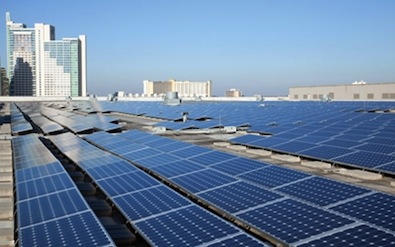 WASHINGTON, D.C. — Investigations are under way on two trade complaints filed by solar and wind companies against Chinese and Vietnamese manufacturers for allegedly selling products in the U.S. below their fair value.
WASHINGTON, D.C. — Investigations are under way on two trade complaints filed by solar and wind companies against Chinese and Vietnamese manufacturers for allegedly selling products in the U.S. below their fair value.
On Oct. 19, SolarWorld Industries, the largest U.S. producer of crystalline silicon photovoltaic products, filed antidumping and countervailing duty petitions with the U.S. Department of Commerce and the U.S. International Trade Commission (ITC) against Chinese crystalline solar cell and panel imports.
The petitions allege those companies dumped, or sold, products in the U.S. at less than fair value — in this case, by margins of more than 100 percent of the adjusted U.S. price.
A preliminary determination in the countervailing duty investigation is scheduled to be released March 20. A preliminary determination of anti-dumping duty was extended from March 27 to May 17, when the Department of Commerce will determine the margin level.
The petitions assert Chinese imports of crystalline silicon cells are being dumped into the U.S. market in dramatic proportions. They also allege Chinese solar cell and panel producers receive a number of illegal subsidies from the Chinese government in the form of cash grants, discounted raw materials, heavily discounted land, power and water, and multibillion dollar preferential loans and directed credit.
Chinese producers also receive tax exemptions, incentives and rebates, export assistance grants and export insurance at preferential rates, the petitions contend.
“The resulting price collapse has had a devastating impact on the U.S. solar cell and panel industry, resulting in shutdowns, layoffs, and bankruptcies throughout the country,” said a statement from the Coalition for American Solar Manufacturing (CASM), of which SolarWorld is a member. “Over the past 18 months, seven solar plants have shut down or downsized, eliminating thousands of U.S. solar manufacturing jobs in Arizona, California, Massachusetts, Maryland, New York and Pennsylvania.”
SolarWorld also requested the Department of Commerce retroactively impose duties on imports of Chinese products, due to a massive surge of solar products that importers allegedly had reason to know were illegally dumped and subsidized. The case excludes thin-film PV products and non-PV technologies, such as solar thermal and concentrated solar.
China exports the vast majority of its solar products, and has a small domestic market, according to the Coalition.
Chinese exports of crystalline silicon solar cells and panels to the U.S. rose more than 350 percent from 2008 to 2010, according to the Coalition. Exports in July 2011 alone exceeded those from all of 2010.
“The continued push of massive volumes of dumped Chinese cells and panels, along with growing margins of underselling at artificially and illegally low prices, ultimately caused market pricing in the United States to collapse in 2011 — with an average worldwide price decline of 40 percent — despite a growing market for these goods,” the Coalition said in a statement.
The group said China does not have a production cost advantage, since labor accounts for only 10 percent of solar panel production costs, and China imports U.S. raw materials and equipment. In addition, the group said China’s extra shipping costs and comparatively lower labor productivity “make its pricing impossible without illegal subsidization and dumping.”
Under U.S. law, the Department of Commerce will determine if dumping and subsidies exist. The International Trade Commission will then conclude whether the U.S. industry is materially injured or threatened with material injury as a result of the imports.
The process is expected to be complete within a year.
A separate commerce-related complaint came on Dec. 29 from the Wind Tower Trade Coalition, which made up of Trinity Structural Towers, DMI Industries, Katana Summit and Broadwind Energy. The Department of Commerce and the International Trade Commission began an investigation Jan. 18.
The International Trade Commission issued a preliminary injury determination on Feb. 10, finding reasonable indication that a U.S. industry was threatened with material injury by China and Vietnam, which were allegedly subsidizing and selling utility scale wind towers in the U.S. at less than fair value.
The U.S. Department of Commerce will continue to conduct investigating imports of those products.
The preliminary countervailing duty determination regarding China is due on March 23, and the preliminary anti-dumping duty determinations regarding China and Vietnam are due June 6. A final determination will be released in about a year.

